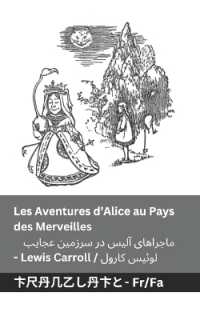基本説明
Topics: the way individuals maintain a stable sense of self, patterns of behaviour in public gatherings, and the structure of common social institutions such as restaurants.
Full Description
Control Systems Theory, a newly developing theoretical perspective, starts from an important insight into human behaviour: that people attempt to control the world around them as they perceive it. This book brings together for the first time the work of prominent sociologists contributing to the development of this wideranging theoretical paradigm.







